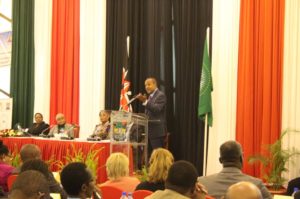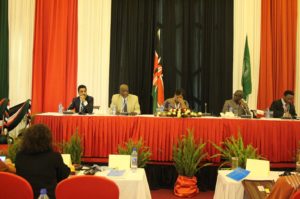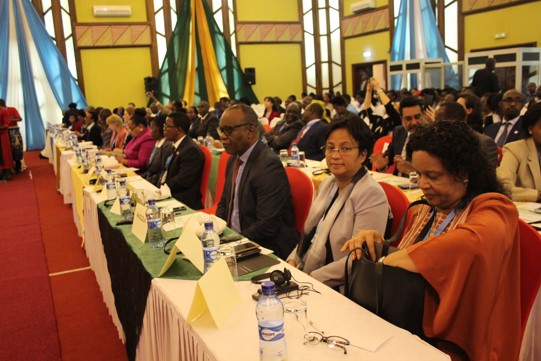Second International Conference on Maternal, Newborn and Child Health in Africa
Kenya proudly hosted the second international conference on maternal, newborn and child health in Africa themed “Maintaining momentum and focus towards ending preventable maternal and child deaths by 2030 – Sustainable path towards Africa’s Transformation.” The conference was held at the Safari Park Hotel in Nairobi from 29th October to 31st October 2018.This conference that brought together different health stakeholders from across Africa and was opened by the first lady, H.E Mrs. Margret Kenyatta, republic of Kenya.
In her opening remarks, she welcomed delegates and guests from different nationalities and further applauded the ministry of Health and the African Union Commission for the efforts made towards a reduction of Maternal and child mortality. “57% of maternal mortality happens in Africa of which 6,000 happens in Kenya. Kenya demands affordable and safe maternal health services. Let us applaud the role and efforts made by the community health workers and skilled health workers.” H.E Mrs. Margret Kenyatta. She further said that the conference is very timely and looks forward to it’s fruitfulness as Kenya has prioritized affordable health as one of the big four agenda.
“This conference has come at a point where there is a lot of issues happening to the women and children. However, We need to work together to bring out the health Agenda to fruition, this will see the achievement of sustainable development goal and further achieve the transformative goal in Africa.” Her Excellency Amira Elfadil Mohammed, Commissioner for Social Affairs African Union.
The conference was also grace by the Cabinet Secretary for Health Mrs. Sicily Kariuki, Principal Secretary for foreign affairs Mr. Macharia Kamau and first ladys’ from different counties across the country. Call for partnerships was key as discussed and reiterated by majority of the key speakers. This was a call to work together and combine efforts and ideas among the Ministry of Health and associated Ministries, private health sector and Non-Governmental Organizations, so as give a solution not only to lower Maternal and child mortality, but also to end it.
In her remarks, the Cabinet Secretary for health Mrs. Sicily Kariuki, applauded the county governments for their efforts in reducing the maternal and child mortality especially fighting against early child marriage thus encouraging education to girl child. She thanked the first lady Mrs. Margaret Kenyatta for her effort in improving accessibility to maternal health services through beyond zero initiatives. “I urge county governments to continue in improving maternal and child health.We need to intensify efforts to keep girls in school. We are glad that the government has prioritized women, children and adolescent health.” Mrs. Sicily Kariuki Cabinet Secretary for Health.
“ Everything that drives peace between each other, between nations and organizations, is based on how we treat each other. This begins at the family level. We need to invest in good health for the mother and child and this should start at the community level.” Mr. Macharia Kamau, Principal Secretary for Ministry of foreign affairs.

“According to a research carried out in March 2018, majority of Kenyans support devolution in health this is very encouraging and gives hopes of a collaboration towards achieving affordable health. Counties have plans of improving nutrition as one of the solution towards ending maternal mortality, however, there are challenges to achieving this and we must collaborate” Dr. Mohammed Kuti, Governor, Isiolo County.
Dr. Amit N. Thakker, Chairman, Kenya Healthcare Federation represented the private health sector on a panel discussion on ‘What Africa needs to stay on track towards ending preventable maternal ,newborn and child death by 2030.’ “We believe that a woman is at the centre of the family, community and above all at the centre of economic growth in Africa” Dr. Amit N. Thakker, Chairman, Kenya Healthcare Federation. Dr. Thakker further informed the attendees that the private sector will focus on four areas including; Supply chain-this will ensure the support local manufacturers through which there will be a reduction of cost of medicines once implemented. Innovations and Technology – the private sector is ready to provide innovations and technology this has been done in India, Kenya and South Africa ranking third .The challenge facing this is how to get the innovations to the market. Human Resources for Health – there is need to recognize the role of the auxiliary health workers and community health workers, in this the private health sector will also concentrate on capacity building.
“Majority of maternal mortality happens at the health facilities, and less has been done in edu-informing people on the reproductive health a major concentration paid on the uterus. This should be at the core of discussion. Majority of maternal deaths occurs as a result of three delays including; delay in decision to seek care, delay in reaching care and delay in receiving adequate health care. However, in order to address maternal mortality, we need a strong health workforce, sufficient equipment and supplies, order and accountability.” Prof. Khama Rogo, Lead Health Sector Specialist, World Bank.

Ms. Faith Muigai, Director, Kenya Healthcare Federation moderated the panel session on ‘the role of private sector in advancing Reproductive, Maternal,Newborn and Child Health(RMNCH) Agenda’ Kenya Healthcare Federation was well represented in the panel discussion by Dr. Jaqueline Kitulu, director – Kenya Healthcare Federation Ms. Ivy Syovata – Philips East Africa, Dr. Peter Kamunyo, director – Kenya Healthcare Federation and Dr. Walter Obita ,director – Kenya Healthcare Federation. Major areas that were highlighted in the discussions were; Strengthening of the human resource especially in the area of capacity building, map out the distribution of health workers especially the specialists, identify the areas in need of health workers, training the health workers on how to handle equipments, role out financing models that is affordable and that covers the under privileged, training on emergency care should be carried out on the health workers. It was noted that there is less family planning facilities and supplies therefore supporting local manufacturers of drugs will see a reduction on the cost thus making the supplies more affordable.
“We need a central mechanism to map out numbers and distribution of all health workers both public and private .This is the only way that then we can plan as a country to recruit ,train and retain a motivated workforce that can equitably be distributed leveraging on all workers in all sectors to provide the much needed quality healthcare to the public. A health service commission is such a body.” Dr. Jacqueline Kitulu, Director, Kenya Healthcare Federation.
There was a unanimous agreement from different nationalities that the private sector, should partner with the ministry of health in sharing best practices, best innovations and technology and share best evidence based research. “We need to agree on partnerships through this there will be support on innovations and technology. for example maternal death prevention technology that can be used by the midwives. Philips East Africa have come up with mobile obstetrics monitoring , a technology that can be used by community health volunteers once trained.”Ms. Ivy Syovata, Philips East Africa.
Basing the discussion on best practice and successes observed in Zambia, Malawi and Liberia a major solution that was discussed in a parallel session on strengthening community plat forms for primary health care, was ‘Trust’ primary health care has been successful in the three countries through the efforts by the community health workers. They are trusted with health advocacy, communication and sensitization, they are trusted with handling health technology and medical equipments such as blood pressure machines.
